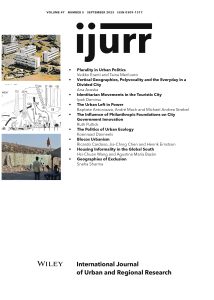A rich seam of waste scholarship already addresses the exclusion faced by informal waste workers as cities in the global South undergo spatial transformations to become ‘world class’. However, less attention has been paid to how state practices have reproduced inequalities within and across waste picker communities. Drawing upon eleven months of ethnographic research at Mumbai’s Deonar dump site, this article maps the practices through which waste workers have responded to their exclusion following a massive fire in 2016. It demonstrates that social exclusion is experienced differently by different members of the community and calls for a greater focus on heterogeneity amongst waste workers. Multi-dimensional vulnerabilities manifest through these workers’ deal-making strategies, while simultaneously mirroring the conditions of marginality produced by the state. The article contributes to debates on marginality by employing the lens of erasure to show how exclusion relies on the optics of visibility and invisibility. By unpicking the hierarchical structure within one waste worker organization, the article argues that the state-led mandate for garbage-free cities in India disproportionately affects those located at the margins of marginalized groups.

